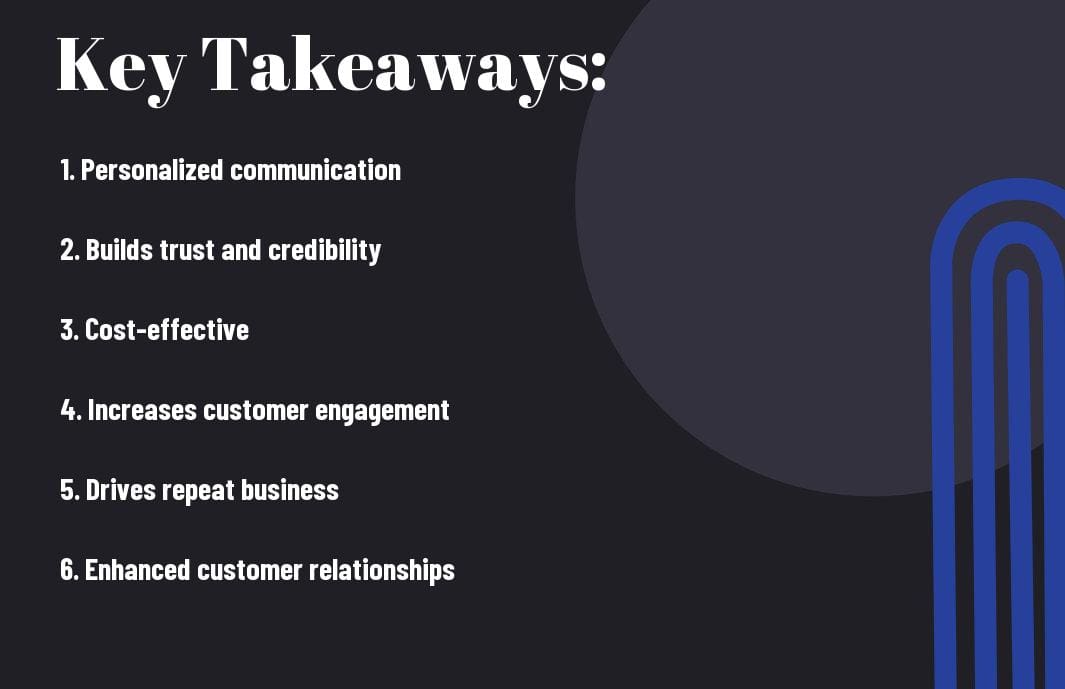You know how important it is to keep your customers coming back for more, right? Well, one powerful tool that can help you achieve this goal is email marketing. By establishing a direct line of communication with your customers, you can build trust and loyalty over time. Want to learn more about how to effectively utilize email marketing in fostering customer loyalty? Check out this comprehensive guide on How To Build Customer Loyalty with eCommerce Email Marketing.
Key Takeaways:
- Personalized Communication: Email marketing allows for personalized communication tailored to each customer’s preferences and behaviors, leading to stronger relationships and increased loyalty.
- Targeted Campaigns: By segmenting your email list and targeting specific groups of customers with relevant content and offers, email marketing can help build customer loyalty by providing valuable and personalized experiences.
- Customer Engagement: Regularly engaging with customers through email campaigns, such as newsletters, promotions, and surveys, can help foster a sense of community and strengthen the bond between the brand and its customers, ultimately leading to increased loyalty.

The Foundation of Email Marketing and Customer Loyalty
Clearly, email marketing plays a pivotal role in building customer loyalty for businesses. It serves as the foundation for creating strong, lasting relationships with customers by allowing brands to engage with their audience on a personal level. By delivering targeted and relevant content directly to their inbox, companies can establish a connection with customers and nurture loyalty over time.
Fundamentals of Building Customer Loyalty
Loyalty is not built overnight; it requires consistent effort and a deep understanding of your audience. By providing value through email marketing, such as exclusive offers, personalized recommendations, and informative content, businesses can show customers that their needs and preferences are being valued. This helps in creating a positive association with the brand and encourages repeat purchases.
How Email Marketing Supports Relationship Building
Customer loyalty is closely tied to the quality of the relationship a brand has with its customers. Email marketing enables businesses to stay connected with their audience consistently. By sending regular updates, product announcements, and personalized messages, companies can reinforce their brand presence in the minds of customers. This consistent communication helps in building trust and loyalty over time.
Supports It’s crucial for brands to leverage email marketing as a tool for relationship building. The direct and personal nature of emails allows businesses to engage with customers on a one-on-one level, addressing their individual needs and concerns. Additionally, email marketing provides a cost-effective way to maintain communication with customers, ultimately leading to increased loyalty and customer retention.
Personalization and Segmentation
Customizing Email Content to Enhance Customer Experience
Enhance your email marketing strategy by customizing email content to cater to the unique preferences of your customers. Personalization is key in today’s digital landscape, where consumers expect tailored messaging that speaks directly to their needs and interests. By utilizing data such as past purchase history, browsing behavior, and demographic information, you can create engaging and relevant content that resonates with your audience.
Leveraging Segmentation for Targeted Campaigns
Targeted campaigns can significantly boost your email marketing performance by segmenting your subscriber list based on specific criteria such as demographics, behaviors, or purchase patterns. This allows you to deliver highly personalized messages to different customer segments, resulting in improved engagement and higher conversion rates. By sending the right message to the right people at the right time, you can build stronger relationships with your customers and drive loyalty.
This level of precision in targeting ensures that your emails are not only more effective but also enhance the overall customer experience. By showing your customers that you understand their needs and preferences, you can build trust and loyalty that will set your brand apart in a competitive market.
Cost-Effectiveness of Email Marketing
Despite the emergence of newer marketing channels, email marketing remains one of the most cost-effective strategies for businesses of all sizes. Compared to traditional marketing channels such as print or TV advertising, email marketing offers a high return on investment and allows businesses to reach a large audience at a low cost.
Comparing Email Marketing with Other Marketing Channels
| Email Marketing | Other Marketing Channels |
| Cost-effective with lower overhead | Expensive advertising costs |
| Immediate delivery and response | Slow response time |
| Targeted messaging | Less targeted audience |
For businesses looking to maximize their marketing budget, email marketing stands out as a highly efficient option. With minimal costs involved in sending out emails to a subscriber list, businesses can drive brand awareness, engage customers, and generate leads without breaking the bank. Additionally, the ability to segment email lists based on customer behavior and preferences allows for more personalized and targeted marketing efforts.
Maximizing ROI through Strategic Email Campaigns
Any business looking to maximize ROI through email marketing should focus on strategic campaign planning. By leveraging data analytics and customer insights, businesses can create tailored campaigns that resonate with their audience, leading to higher open rates, click-through rates, and ultimately, conversions. Implementing A/B testing, optimizing email send times, and crafting compelling subject lines are all crucial tactics in maximizing the effectiveness of email marketing campaigns.
Plus, businesses can track the performance of their email campaigns in real-time, allowing for quick adjustments to improve results. This level of flexibility and measurability sets email marketing apart from other traditional marketing channels, providing businesses with valuable insights to continuously refine their strategies and drive higher ROI.
Consistent Communication and Brand Building
Establishing Brand Presence through Regular Newsletters
Keep your brand top of mind by sending out regular newsletters to your subscribers. By consistently showing up in their inbox, you are reinforcing your brand and fostering a sense of familiarity and trust with your audience. This approach helps to establish a strong brand presence and keeps your business at the forefront of customers’ minds when they are ready to make a purchase.
Creating Compelling Content that Resonates with Subscribers
Brand loyalty is built on more than just promotional emails. Create compelling content in your newsletters that resonates with your subscribers on a personal level. Share valuable insights, industry updates, and helpful tips that demonstrate your expertise and provide genuine value to your audience. By crafting content that speaks to the needs and interests of your subscribers, you can deepen their engagement with your brand and foster long-lasting relationships.
Presence: When creating content for your email newsletters, focus on providing value to your subscribers rather than just selling to them. Engage with your audience by sharing stories, educational content, and exclusive offers that resonate with their interests and needs. This approach helps to build a loyal following who sees your brand as more than just a provider of products or services, but as a trusted source of information and solutions.
Incentives and Rewards Programs
The Role of Exclusive Offers in Retaining Customers
On the journey of building and maintaining customer loyalty through email marketing, exclusive offers play a pivotal role. By providing customers with special discounts, promotions, or early access to new products, businesses can create a sense of exclusivity and appreciation among their audience. This feeling of being valued and rewarded for their loyalty can significantly impact a customer’s decision to stay with a brand for the long term.
Implementing a Successful Email-Based Loyalty Program
Successful implementation of an email-based loyalty program requires strategic planning and effective execution. By segmenting customers based on their preferences and purchase history, businesses can tailor their loyalty program to suit the individual needs of their audience. Personalizing rewards and incentives can increase customer engagement and strengthen brand loyalty.
Customers are more likely to participate in a loyalty program when they see personalized benefits that cater to their specific interests and behaviors. Creating a seamless user experience across all touchpoints, from email communication to the redemption of rewards, is crucial in ensuring the success of an email-based loyalty program.
Data Analysis and Campaign Optimization
Monitoring Key Metrics to Understand Customer Behavior
For an effective email marketing strategy, it is crucial to monitor key metrics that help in understanding customer behavior. By analyzing metrics such as open rates, click-through rates, conversion rates, and unsubscribe rates, businesses can gain valuable insights into how their audience is engaging with their emails. Understanding these patterns can enable businesses to tailor their content and offers to better meet the needs and preferences of their customers.
A/B Testing and Continuous Improvement of Email Strategies
Data-driven decision-making is the cornerstone of successful email marketing campaigns. A/B testing involves sending out variations of an email to different segments of your subscriber list to see which performs better. Understanding which elements of an email drive engagement and conversions allows businesses to continuously improve their email strategies. By testing different subject lines, calls to action, or imagery, businesses can refine their messaging to resonate more effectively with their audience.
Data from A/B tests can provide actionable insights that can be used to optimize future campaigns. By iterating on what works and discarding what doesn’t, businesses can ensure that their email marketing efforts are continuously improving and delivering the best possible results.
Legal and Ethical Considerations
Once again, when engaging in email marketing to build customer loyalty, it is crucial to consider the legal and ethical aspects of your strategies. Failing to adhere to regulations and ethical standards can not only damage your brand’s reputation but also lead to costly consequences.
Adhering to Email Marketing Regulations (e.g., GDPR and CAN-SPAM Act)
One of the primary legal considerations in email marketing is ensuring compliance with regulations such as the General Data Protection Regulation (GDPR) in Europe and the Controlling the Assault of Non-Solicited Pornography And Marketing (CAN-SPAM) Act in the United States. These regulations govern how businesses can collect, store, and use customer data for marketing purposes. It is vital to obtain explicit consent from individuals before sending them marketing emails and provide easy opt-out options to comply with these regulations.
Maintaining Consumer Trust through Transparent Practices
Legal and ethical considerations go hand in hand when it comes to maintaining consumer trust through transparent email marketing practices. Consumers expect businesses to be transparent about how their data is being used and to respect their privacy rights. By being transparent about your data collection practices, honoring opt-out requests promptly, and ensuring the security of customer information, you can build trust and loyalty with your audience.
Plus, maintaining transparency and ethical practices not only helps you comply with legal requirements but also fosters a positive brand image and enhances customer loyalty over time.
Final Words
Conclusively, email marketing is a powerful tool in building customer loyalty due to its ability to deliver personalized and relevant content directly to customers. By consistently engaging with customers through targeted emails, businesses can build strong relationships, foster trust, and keep their brand top of mind. Additionally, email marketing allows businesses to track engagement metrics, gather valuable customer data, and make data-driven decisions to improve their marketing strategies and strengthen customer loyalty over time.
FAQ
Q: What are the benefits of email marketing in building customer loyalty?
A: Email marketing allows businesses to engage with customers on a personal level, nurture relationships, provide valuable content, and offer exclusive deals to build customer trust and loyalty over time.
Q: How does email marketing help in customer retention?
A: Email marketing enables businesses to stay top-of-mind with customers, send targeted messages based on their preferences and purchase history, and provide ongoing value that encourages repeat purchases and long-term loyalty.
Q: What role does personalization play in email marketing for customer loyalty?
A: Personalized emails that address customers by name, recommend products based on their past purchases, and tailor content to their interests create a more engaging and relevant experience that fosters customer loyalty.
Q: Can email marketing help in building brand loyalty?
A: Yes, by consistently delivering valuable content, promotions, and updates, businesses can strengthen their brand image, increase customer satisfaction, and foster a sense of loyalty and connection with their audience through email marketing.
Q: How does email marketing contribute to customer engagement and loyalty?
A: Email marketing allows businesses to send targeted messages at the right time, encourage customer feedback and interaction, and create a two-way communication channel that keeps customers engaged, informed, and loyal to the brand.
Q: What are some best practices for using email marketing to build customer loyalty?
A: Some best practices include segmenting your email list, personalizing your messages, providing valuable content, incorporating customer feedback, and continually optimizing your email campaigns to ensure relevance and effectiveness in building customer loyalty.
Q: How can businesses measure the effectiveness of email marketing in building customer loyalty?
A: Businesses can track key performance indicators (KPIs) such as open rates, click-through rates, conversion rates, and customer lifetime value to gauge the impact of email marketing on customer loyalty and make data-driven decisions to improve results over time.




